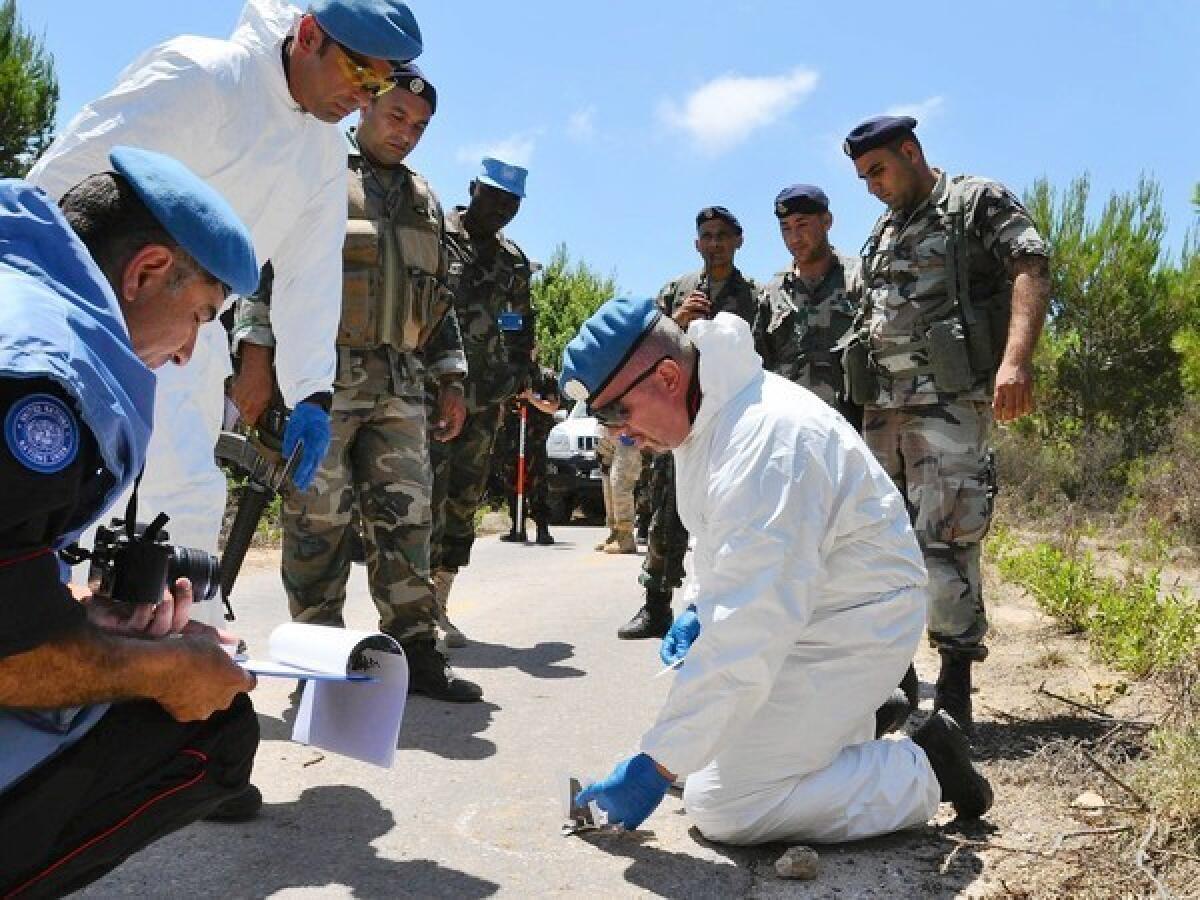Hezbollah ambushed intruding Israeli soldiers, group’s chief says

- Share via
BEIRUT— It was an incident shrouded in mystery that occurred in one of the Middle East’s most sensitive areas: the “Blue Line” demarcating the frontier between southern Lebanon and northern Israel.
Shortly after midnight on Aug. 7, four Israel soldiers were wounded along the United Nations-designated line, which for the most part has been quiet since Israel and Hezbollah forces fought a monthlong war in 2006.
After the incident, Israel issued a vague and terse statement saying its soldiers had suffered light to moderate injuries when an “explosion” occurred “during an overnight activity adjacent to the northern border.” Israeli officials did not say whether the mission was a training, combat or intelligence-gathering operation.
The Lebanese army denounced what it said was a violation of its nation’s sovereignty, charging that an Israeli infantry patrol had moved about 400 yards into Lebanese territory before the blast occurred. Some reports speculated that the Israelis had triggered a land mine, one of many left over from the brief but bloody 2006 conflict.
Last week, however, Hezbollah’s leader, Hassan Nasrallah, said in a televised interview that the incident was not a case of Israeli infantrymen inadvertently setting off old ordnance. Rather, Nasrallah labeled it a well-planned ambush by “the resistance,” as the militant Islamist group calls itself, after it received intelligence about an Israeli operation near the Lebanese village of Labbouneh.
“This area is in particular under the surveillance of the resistance fighters, and we had previous information stating that the Israelis will pass through it,” Nasrallah told Al Mayadeen television, a Lebanon-based network.
According to Nasrallah, Hezbollah planted explosives along the route and detonated a device targeting the “special Israeli force,” and then exploded another when a second group of Israeli soldiers “intervened,” apparently in response to the initial blast.
He did not provide additional details but warned, “We will face the Israeli in any place he steps inside Lebanon. We won’t allow them to enter.”
Though the accuracy of Nasrallah’s account could not be confirmed, the incident provided an opportunity for the Hezbollah chief to boast of his movement’s focus on arch foe Israel at a time when many Sunni Muslims in the Arab world have assailed the Shiite Muslim group for intervening in Syria on behalf of President Bashar Assad. Hezbollah’s critics called the interview, which also included new details about the 2006 war, a publicity stunt designed to divert attention from Hezbollah’s presence in Syria to its generally popular stance against Israel.
A more dramatic event soon confronted Hezbollah, a dominant political and paramilitary force in Lebanon. A day after Nasrallah’s televised revelations, a massive car bomb exploded Thursday in a pro-Hezbollah district of southern Beirut, killing at least 21 people and wounding hundreds. It was the latest and most deadly in a series of attacks against Hezbollah enclaves and sympathizers, all apparently linked to the group’s pro-Assad stance.
Israeli officials have not commented on Hezbollah’s version of the Aug. 7 blast that injured four Israeli soldiers.
The United Nations, which maintains a large peacekeeping force along the Blue Line, issued a statement saying it was investigating the Israeli “violation,” which Italian Maj. Gen. Paolo Serra, who heads the international unit here, called “a serious breach of the terms of U.N. Security Council Resolution 1701.” That was the resolution that led to the cease-fire ending the 2006 conflict between Israel and Hezbollah.
Although the Blue Line has been largely calm since 2006, each side has accused the other of various violations. Lebanese officials cite regular Israeli flights over its territory, while Israel says Hezbollah continues to receive rockets and other arms from Syria.
Times staff writer Edmund Sanders and news assistant Batsheva Sobelman in Jerusalem contributed to this report.
More to Read
Sign up for Essential California
The most important California stories and recommendations in your inbox every morning.
You may occasionally receive promotional content from the Los Angeles Times.










